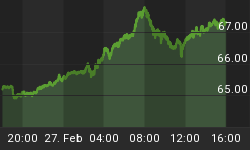FREE eBook reveals why the Fed is powerless to change the economic course
As the world's leading stock markets continue to play stomach-hockey with investors via one triple-digit turn after another, the mainstream community takes solace in this core belief: No matter how uncertain things become, the Federal Reserve can at any moment swoop in to set the economy right.
In reality -- the Fed has no such power. This is the revelation of Elliott Wave International's newest complimentary resource from Club EWI: the 35-page eBook titled "Understanding the Fed." Including excerpts from the selected works of EWI President Robert Prechter -- including his 2002 book "Conquer the Crash" and several past "Elliott Wave Theorist" publications -- this riveting report exposes once and for all the most dangerous myths about the Federal Reserve.
Chapter 3 (of the 8-chapter anthology) attends to the "Potent Directors Fallacy" -- i.e., the false notion that the central bank is in control of the U.S.'s money, market, and economy -- and offers this "Conquer the Crash" insight:
"For recent examples of the failure of the idea of efficacious economic directors, just look around. Since Japan's boom ended, its regulators have been using every presumed macroeconomic 'tool' to get the Land of the Sinking Sun rising again, as yet to no avail. The World Bank, the IMF, local central banks, and government officials were 'wisely managing' South East Asia's boom until it collapsed spectacularly in 1997. In America, the Federal Reserve has lowered its discount rate from 6% to 1.25%, an unprecedented amount in such a short time... What will it do if the economy resumes its contraction; lower rates to zero?"
Note: The underlined sentence above was written in 2002. Today, that forecast has come to fruition after the Fed's rate-slashing campaign since September 2008 has brought rates to the zero level.
Chapter 3 then goes on to explain WHY the Fed's monetary policy failed to lift the hot-air balloon of the economy out of the violent credit and housing downdraft. Here, the eBook writes:
"The Fed's ultimate goal is to influence public borrowing from banks. During economic contractions, banks become fearful. At such times, low Fed-influenced rates cannot overcome creditors' disinclination to lend and/or customers' unwillingness or inability to borrow. Thus, regardless of assertions to the contrary, the Fed's purported 'control' of borrowing, lending, and interest rates ultimately depends upon an accommodating market psychology and cannot be set by decree."
Once again, flash ahead to today and the disintegration of optimism and shift toward conservation can be seen in the following data from February 2010:
- Year-over-year bank credit was (negative) - 6.8% vs. 10% in 2007
- Loan availability to small businesses plunged to the lowest level since interest rate crisis of 1980, thus drying up a major means of debt repayment.
- The number of banks tightening their lending standards has soared, while consumer credit and tax revenue is plunging.
- And, residential and commercial mortgages are plunging, as more and more home/business owners are walking away from their leases.
In Bob Prechter's own words: Once you can assimilate the truths contained in this eBook, "you will have knowledge of the banking system that one person in 10,000 has."
Do you want to really understand the Fed? Then keep reading this free eBook, "Understanding the Fed," as soon as you become a free member of Club EWI.















